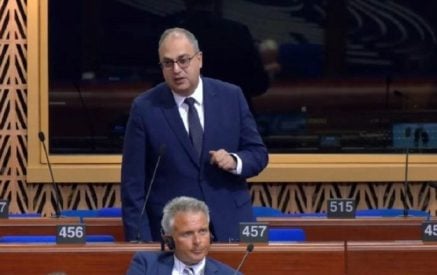On February 18, the meeting of the experts from the OSCE Office for Democratic Institutions and Human Rights (ODIHR) and the deputies and experts from the RA NA Standing Committee on State and Legal Affairs was held in the National Assembly. The topic of parliamentary integrity and code of conduct was at the core of the discussions.
“The issue of having the best model of the Committee on Ethics of the RA National Assembly has been discussed for a long time. We have a preliminary draft,” the Chair of the NA Standing Committee on State and Legal Affairs Vladimir Vardanyan said and highly appreciated the support of the OSCE/ODIHR in this process.
The Deputy Chair of the NA Standing Committee on State and Legal Affairs Arusyak Julhakyan mentioned that the work on the development of the Committee on Ethics and the rules of conduct of deputies in the seventh convocation of Parliament was postponed due to a number of circumstances. Now these works have resumed. According to the deputy, having a Committee on Ethics is important, because it determines both the development of political and democratic culture in Parliament and the establishment of the political system in general.
“If we had clear rules of conduct agreed upon by all the Factions, if we had a functional Committee on Ethics, it could have a fairly restraining effect on the deputies in terms of their manifestations,” Arusyak Julhakyan expressed conviction, speaking about the importance of ensuring integrity in the Parliament.
Read also
“Accountability, integrity and transparency are not only vitally important, but also strengthen and consolidate the foundations of democracy, because you represent your people. It is important that members of Parliament meet the highest level of integrity, and the people have confidence in institutions. Therefore, well-defined rules of conduct are very important both for Parliaments and in terms of inspiring other institutions, the ODIHR Chief of the Democratic Governance and Gender Unit Yulia Netesova said and informed that there are proposals from the Group of States against Corruption (GRECO), which also emphasize the existence of the Standing Committee on Ethics.
Then During the presentation, OSCE/ODIHR Associate Democratic Governance Officer, ODIHR Anti-Corruption Focal Point Nina Chanturia presented in detail the work of ODIHR in the field of public ethics and integrity, and touched upon the successful models in the OSCE region. It was noted that in 2007, 9 Parliaments in the OSCE region had codes of conduct, and today there are 43. The main concepts and mechanisms of parliamentary integrity, methods of implementing the codes of conduct, sanctions in case of violation, anti-corruption directions, detection and exclusion of violence against women in politics, and the issue of conflict of interest were discussed in detail. The peculiarities of the good conduct system in the parliaments of a number of countries that have codes of conduct were presented.
The Q&A session was followed by a discussion of the draft code of conduct and the framework of parliamentary integrity in the Parliament of our country.
The participants of the discussion attached importance to the definition of rules of conduct characteristic of the parliamentary culture of the Republic of Armenia. The following opinion was expressed: A stable mechanism is necessary that will fully fulfill its function regardless of the change of political forces.
In conclusion, Arusyak Julhakyan underscored the importance of such meetings and proposed organizing a similar discussion in the near future and addressing the issues in a more substantive manner.
RA NA























































